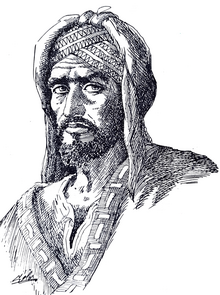
Back امرؤ القيس Arabic امرؤ القيس ARZ ইমরুল কায়েস (কবি) Bengali/Bangla Imru'l Qays Catalan Imru' al-Qais German Imru'l Qays Spanish امرؤالقیس Persian Imru’l-Qais Finnish Imrou'l Qays French Imru l-Kajsz Hungarian
Imru' al-Qais | |
|---|---|
 1968 sketch of Imru' al-Qais' | |
| Born | Junduh bin Hujr al-kindi 496 AD Kinda, Central Arabia |
| Died | 565 (aged 63–64) Ankara, Eastern Roman Empire |
| Occupation | Poet |
| Language | Classical Arabic |
| Period | Pre-Islamic Arabia |
| Relatives | Muhalhil (uncle) |
Imruʾ al-Qais Junduh bin Hujr al-Kindi (Arabic: ٱمْرُؤ ٱلْقَيْس جُنْدُح ٱبْن حُجْر ٱلْكِنْدِيّ, romanized: Imruʾ al-Qays Junduḥ ibn Ḥujr al-Kindiyy) was a pre-Islamic Arabian poet from najd in the late fifth and early sixth centuries and also the last King of Kinda. He is sometimes considered the father of Arabic poetry. His qaṣīda, or long poem, "Let us stop and weep" (قفا نبك qifā nabki) is one of the seven Mu'allaqat, poems prized as the best examples of pre-Islamic Arabian verse. Imru' al-Qais was born in the Al-Qassim Region of northern Arabia sometime in the early 6th century. His father was said to be Hujr bin al-Harith (حجر ابن الحارث Ḥujr ibn al-Ḥārith), the Kindan regent over the Arab tribes of Asad and Ghatafan, and it is believed that Imru' al-Qais was born in the territory of Asad. His mother was said to be Fatimah bint Rabi'ah al-Taghlibi (فاطمة بنت ربيعة التغلبي / Fāṭimah bint Rabī‘ah al-Taghlibī).
Legend has it that Imru' al-Qais was the youngest of his father's sons, and began composing poetry while he was still a child. His father strongly disapproved of this habit in his son, believing poetry to be an unseemly pastime for the son of a king. His father also disapproved of Imru' al-Qais' scandalous lifestyle of drinking and chasing women and eventually banished him from his kingdom, or so the legend goes. But later, when the Asad rebelled and assassinated his father, Imru' al-Qais was the only one of his brothers to take responsibility for avenging his death. Renouncing wine and women, he fought the tribe of Asad until he had exacted revenge in blood, and spent the remainder of his life trying to regain his father's kingdom.
Like many figures of early Arabia, which at that time lacked a formal writing system and relied on the oral transmission of stories, the details of the life of Imru' al-Qais are hard to determine with any certainty. Even so, historians have been able to compare the various stories written down by later biographers with clues from Imru' al-Qais' poems and information about major historical events in the Sasanian and Byzantine Empires to reconstruct a probable account of the life and ancestry of this most famous of the Jahili poets.
According to one account, his full name and ancestry was Imru' al-Qais, son of Hujr, son of al-Harith, son of 'Amr, son of Hujr the eater of bitter herbs, son of Mu'awiyya, son of Thawr of the tribe of Kinda (Arabic: إمرؤ القيس ابن حجر ابن الحارث ابن عمرو ابن حجر اكل المرار ابن معاوية ابن ثور الكندي). He was also referred to as "the Lost King" (الملك الضليل al-Malik aḍ-Ḍalīl) because he was never able to recover his father's throne.
© MMXXIII Rich X Search. We shall prevail. All rights reserved. Rich X Search